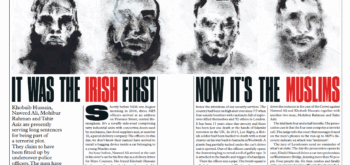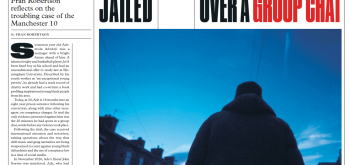The Prime Minister David Cameron launched his latest attack on the ‘compensation culture’ pledging to slash the £1,200 fee for lawyers on small personal injury claims. [Pic by Sehb Hundal].
‘I am determined to tackle this damaging compensation culture which has been pushing up premiums,’ the PM said. ‘I want to stop trivial claims, free up businesses from the stranglehold of health and safety red tape and look at ways we can bring costs down. The insurance industry plays such an important part in all our lives – it is there to help when we are at our most vulnerable and at greatest need. But I want to ensure that we all do what we can to help people through this difficult time.’
Cameron met with insurers, consumer and business groups (but apparently not lawyers, see below) on Tuesday to discuss ‘the rising premiums that many drivers, families, consumers and businesses are facing, and the action that the Government is taking to help bring these down’.
According to the PM, Britain is now ‘the whiplash capital of Europe’ with more than 1,500 claims a day.
The Government and insurers agreed:
- to ‘pass savings onto customers’ resulting from a Government commitment to reduce the current standard £1,200 fee that lawyers from small value personal injury claims (less than £10,000);
- to ‘adjust premiums to reflect any reductions in legal costs’ created through the government’s reforms under the Legal Aid, Sentencing and Prisoner of Offenders Bill that will reform ‘no win, no fee’ and ban referral fees – see HERE;
- to work together to identify effective ways to reduce the number and cost of whiplash claims (through improved medical evidence, technological breakthroughs, the threshold for claims or the speed of accidents);
- to ‘challenge more vexatious health and safety civil claims in order to tackle the compensation culture’;
- to ‘look at what more can be done regarding young drivers’ risk and safety’, including the wider use of telematics or ‘smartbox’ technology.
The so-called compo culture… the government’s assertion that there is a compensation culture flies in the face of recent reports. Lord Young of Graffham reported to David Cameron, as leader of the Conservative Party, in December 2010 after a Whitehall-wide review of health and safety laws and the growth of the so-called ‘compensation culture’. His report found ‘behind the myth, the truth behind health and safety hysteria, the problem of the compensation culture prevalent in society today is one of perception rather than reality.’ ‘Many of the stories we read and hear either simply aren’t true or only have a grain of truth in them,’ claimed the government advisory body, the Better Regulation Task Force, in a 2004 report on the compensation culture. Chapter titles included ‘Exploding the Urban Myth’ and ‘It’s all in the mind’. Less consolingly, the BRTF concluded we live in a ‘have-a-go’ society. Inaccurate press coverage, combined with the antics of claims companies, encouraged people to ‘have a go’ creating ‘a perception, quite inaccurately, that large sums of money are easily accessible’.
You can read Tom Jones, of Thompsons’ law firm, on ‘the myth of the compo culture’ HERE and how one insurer treated a whiplash claim.
‘My firm settled a claim for a client who suffered whiplash. Within hours of the accident, the Royal and Sun Alliance – the other driver’s insurer – were on the phone admitting liability. There followed what in any other circumstances would be harassment. At 9.30 the next morning the injured woman was called by RSA and offered £1,000 for her injuries. Half an hour later they called again to confirm the offer and again at 4.30pm. Upset by this hounding, the woman resisted the temptation. She hadn’t given a thought to a claim. She was in shock and pain. When RSA called again, she had spoken to a colleague who advised her to go to her union. Her claim settled for five times the amount first offered by the insurer. Is systematically pursuing people for a claim after an accident evidence of a compensation culture?’
You can read here on the JusticeGap a report by the House of Commons Transport Committee which argued that an increase in claims for whiplash was the main reason for the growth of motor insurance premiums.
The committee’s chairman, Louise Ellman said whiplash claims were expensive for insurers to challenge and diagnosis ‘often subjective’. Her report found that the increase in accident claims, predominantly whiplash, was ‘the main reason for the rise in premiums’.
‘Although we strongly support access to justice, drivers should not be railroaded by cold callers into launching legal action. The insurance industry must abandon sharp practices that push up premiums such as passing drivers’ personal data to other parties or taking secretive referral fees from solicitors, garages and car hire firms.’
Meanwhile claimant lawyers accused Cameron of ‘sidelining the legal profession’ at the summit. ‘We wrote to the prime minister over a month ago, but it is disappointing that our offer to work with him and his government in addressing public concerns over whiplash claims has been ignored,’ said Law Society president, Des Hudson.
Hudson argues that the insurance industry ‘has many questions to answer’ for the rise in whiplash cases. ‘The motor insurance industry is profiting from providing what is in effect a public service, as it is a legal requirement to have motor insurance,’ he argues. ‘It is up to insurers to fight cases that they feel are inappropriate. If the insurance industry simply pays out when it sees the word “whiplash” whether the case is justifiable or not is it any wonder these claims are rising?’ The issue of whiplash is ‘not an isolated case’, he argues. ‘What are insurers doing to stop the racket of inflated courtesy car hire charges whilst selling claimants details? Hudson accuses the insurance industry of ‘fuelling the costs of accidents and passing them back to motorists’.
‘The fact that it sells accident details to third parties inevitably fuels the number of claims. Some firms have a record of seeking to pay off the victim of an accident whether or not that victim has been injured. There needs to be a full investigation of the industry’s practices. It needs to put its own house in order before pointing the finger at others. ‘
Hudson also points out that ‘whiplash can be a painful and debilitating injury’. ‘Claimants who seriously suffer from it are entitled to compensation and the Government should not make it more difficult to claim that compensation just because the insurance industry has failed to sort itself out.’






A detailed critique of the Court of Appeal judgment in the case of Oliver Campbell